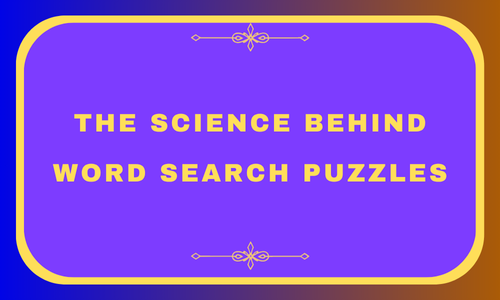Most people think of word searches as a fun pastime — something to pass the time while relaxing. But beneath that simple activity lies an impressive amount of brain science. Cognitive researchers have found that word searches stimulate multiple areas of the brain responsible for attention, memory, and visual processing. Let’s explore how this seemingly easy game delivers real cognitive benefits backed by psychology and neuroscience.
Engaging Multiple Brain Regions
When you scan the puzzle grid, your brain’s visual cortex, frontal lobe, and temporal lobe work together. The visual cortex processes letters and patterns; the frontal lobe organizes your search strategy; and the temporal lobe connects those letters to stored words in your memory. This multi-region activation improves coordination between mental functions — a key factor in maintaining long-term cognitive health.
Strengthening Working Memory
Working memory helps you hold information temporarily while performing tasks. In a word search, you remember the word list while scanning the grid, mentally testing patterns and eliminating incorrect options. This constant juggling strengthens the brain’s “mental workspace,” which is critical for focus, learning, and decision-making.
Building Pattern Recognition Skills
Pattern recognition is essential for everything from reading to problem-solving. By repeatedly identifying letter sequences and spatial arrangements, your brain becomes more efficient at recognizing visual cues. This improved pattern detection carries over to everyday activities — such as reading quickly, remembering details, or spotting visual changes in your surroundings.
Training Focus and Attention
The simple act of searching for a word demands sustained concentration. You must ignore distractions, scan the grid systematically, and keep track of words you’ve already found. This type of focused attention mirrors mindfulness training, strengthening your brain’s ability to stay in the moment and resist mental fatigue.
Promoting Neuroplasticity
Neuroplasticity is the brain’s ability to adapt, grow, and form new neural pathways. Word searches stimulate this process by challenging your brain to find different routes to problem-solving. Each puzzle creates subtle variations in how you search, forcing your mind to adapt and reinforcing flexible thinking.
Reducing Cognitive Decline
For seniors, regular engagement in brain-stimulating activities is linked to slower cognitive decline. Word searches provide gentle yet consistent stimulation without frustration or stress. Studies suggest that keeping your mind active through simple puzzles can help maintain memory, reasoning, and processing speed over time.
Balancing Relaxation and Stimulation
Unlike fast-paced digital games, word searches strike a unique balance — your brain stays active but calm. The repetitive scanning and light challenge create a soothing rhythm, lowering stress hormones while keeping your mind alert. This makes them an ideal daily habit for cognitive wellness.
Accessible Brain Training for Everyone
The beauty of word searches lies in their simplicity. You don’t need expensive apps or complicated tools to train your brain — just a pencil, a printed page, or a device screen. People of all ages can enjoy them, regardless of skill level, making them one of the most inclusive cognitive exercises available.
The Science in Action
The next time you pick up a puzzle, remember that every line you scan is like lifting weights for your mind. You’re improving attention control, visual scanning, and memory synchronization — all key pillars of cognitive fitness. What feels like play is, in fact, powerful mental training.
Ready to give your brain a boost?
Try our Daily Word Search Puzzles — they’re fun, relaxing, and backed by real brain science.

